
A man from a homeless encampment receives care from Circle The City's mobile medical unit on the 14th day of temperatures rising to 114 degrees F July 13 in Phoenix. Bishop Edward Weisenburger of the Diocese of Tucson, Arizona, calls climate change a critical topic. (OSV News/Reuters/Liliana Salgado)
On July 23, an Arizona bishop published an op-ed in his local newspaper that addressed one of the most pressing — and polarizing — issues of our day. It was not, however, the topic that many people have come to expect to hear a Catholic leader speaking out about.
In "Climate Change and Hope," Bishop Edward Weisenburger of the Diocese of Tucson, Arizona, shed light on what he calls a "critical," "profound," "human" issue of "life and death": climate change and what the U.S. Catholic Church is doing about it.
As the hottest summer on record came to an end, I asked Weisenburger about the motivation behind his op-ed and what he hopes to hear from Pope Francis on the topic of creation care in the future, including in his forthcoming apostolic exhortation "Laudate Deum," set to be released on Oct. 4.
This interview has been edited for length and clarity.

Bishop Edward Weisenburger (Courtesy of the Diocese of Tucson)
EarthBeat: What prompted you to write your July 23 op-ed on climate change and hope for the Arizona Daily Star?
Weisenburger: I was encouraged by people to write it. It's a critical topic. We need to look at the things that our people are interested in and bring the light of the Gospel to that. Climate change is one of the top burning issues for people today, especially young people.
I'm always hearing older Catholics — like my age, in their 60s — saying, "We need the kids." And yet we don't seem to talk oftentimes about the things that matter deeply to them. Our Holy Father is doing that quite well. So I was also kind of taking a cue from Pope Francis on some level.
Why did you decide to place your message in a mainstream newspaper rather than a Catholic publication?
Bishops have to focus more on speaking to their people. In the ordination right of a bishop, the prayers stress that you're not just ordained for the Catholics of a diocese, you're ordained for all the people of a diocese. So you're supposed to show a concern beyond just your parishes or your schools to everyone.
An article like that in a public newspaper resonates with people of goodwill and people of other faiths, and they recognize that care for creation as outlined by Pope Francis and embraced by our church is critical.
The National Weather Service recorded that we hit 111 degrees Fahrenheit on a day in September. That affects not just Catholics. That affects everybody.
We've had thousands of dead bodies found in the desert. A third of the heat deaths we've had in Arizona in the last couple of months were migrants.
From March to August, the Pima County medical examiner said there were 178 heat-related deaths. Yuma County, about four hours west of Tucson, which is also part of my diocese, is oftentimes one of the hottest places in the nation. From May to August, Yuma County had 29 heat-related deaths. Those numbers add up, and many are migrants and poor people who can't escape the heat.
Climate change isn't a theoretical issue. It is a practical, local issue of local concern.
Climate change isn't a theoretical issue. It is a practical, local issue of local concern.
—Bishop Edward Weisenburger
In the op-ed, you say that Pope Francis, in his 2015 encyclical "Laudato Si', on Care for Our Common Home," articulates the same hope that you hold for our ability to stabilize the climate and protect the future of life on earth. You call that hope "realistic, grounded, and profound." But some people — especially after experiencing the extreme weather of this summer — would say this hope you describe is unrealistic. What makes you so sure that humanity can change course and create a healthier, safer world going forward?
I'm a bishop, a quasi-theologian, a pastor, and I'd like to think, a man of the Gospel. But as someone without a scientific background per se, I can look at world history and see that the Earth has an ability to rebound from horrible things that happen.
We can do immense, horrible damage. We can see places where we think this will never rebound — and I'm not saying that we can rebound from anything, and I don't want to have to wait a million years to rebound either — but I am impressed by the way God created this world. The damage can be repaired in many instances.
But we have to pull together and we have to be responsible. We have an obligation not to destroy just for the sake of today or for the sake of destroying.
An asteroid blasted into the earth millions of years ago and destroyed two-thirds of life, and yet you can look at the world today and see life flourishing.
That, with the Gospel, gives me hope.

Thumb Butte is seen in Arizona's Prescott National Forest on June 24. (OSV News/Bob Roller)
You thought it was important for Catholics, and others, in Tucson to know that the U.S. bishops' conference supported the EPA proposal to put stricter limits on carbon pollution from power plants. For places with bishops who might not be so willing to write op-eds advocating for support of climate policy, how best can concerned Catholics spread the word that this is an issue of importance to the church?
The secular media says the church is fixated on sex, and yet I can tell you when a bishop goes to a press conference the questions are all about sex, whether it's sexual abuse of minors or the church's teaching on sexual ethics or abortion. And so there are bishops like me who feel we have to find ways to get around what I think is the secular world's fixation on those issues so that we can show the broad and rich teaching and discernment of the church and show that we look at a host of issues very carefully and have a lot to say but it's not for the interest of the public media.
And sometimes in our Catholic media in the United States, we're very focused on abortion. I am entirely and completely anti-abortion. I am entirely pro-life. I am appalled along with the Holy Father at the thought of taking a child's life in its mother's womb. We say sometimes abortion is the preeminent ethical issue of the day. The way Americans interpret that is that other issues, like care for creation, don't really matter.
I like the term "abortion is the premier issue of the day," but I interpret that in a slightly different way. Abortion is the preeminent issue because if you get it wrong on abortion, you're going to get it wrong on everything else. But if you get it right on the preeminent issue, you'll begin to see that destroying the world and making it an inhabitable place, that's a profound issue. That's a human issue. That's life and death.
We can wed a little bit more of our church's teaching than we think sometimes. The Holy Father has done a number of encyclicals that have common themes woven through them, and respect for life is one of them.
Advertisement
How else have you embraced church teaching on care for creation in the Diocese of Tucson?
We have a car dealer here that for many years has provided the diocese with a car for the bishop to drive. I called about a month ago and said, "Beggars can't be choosers, but could we look at an EV?" And he said, "I think that's a brilliant idea. Let me work on it." I'm a little nervous because I drive such long distances, and we need to look at those charging stations and what not, but I'm kind of excited about it.
And one of our parishes, years ago, put solar up for their parking lot panels. It was a 10-year lease to own and now they own it all and they say it's doing great.
Two of our parishes with big schools recently put in solar with a company where they lock in your electricity rate for 10 years. They put in covered parking in the parking lot and a massive covered area in the playground, and it's now providing all the electricity.
They're looking at putting it in here at our parking lot at the chancery, which we share with the cathedral. We're hoping within 2 to 3 months to start having new covered parking with the solar.
And there are a couple of parishes that have pretty active care for creation committees. It also flows somewhat through our Catholic high schools. We see interest there, too. They all have programs that are geared toward sustainability.
So it's spreading and it's being embraced and that's really exciting for me.

Cactuses are pictured at Gates Pass May 20, 2022, in Tucson, Arizona. (CNS/Bob Roller)
What do you hope Pope Francis says in his upcoming apostolic exhortation, Laudate Deum, that has been described as an update to Laudato Si'?
Any teacher will tell you that if it's important, you better say it twice.
Laudato Si' was magnificent. He said it beautifully. But just the fact that he is going back to revisit the topic shows its critical importance for the day.
I almost feel the fact that he's revisiting it is equally as important as whatever he actually ends up saying. He's shedding the light once again, focusing the light on where it needs to be in this area of care for creation.
Of course, I have no insights as to what's going to be there, but I would be very open to him issuing maybe a little bit stronger challenge for us to meet the needs of the day, especially in America where we continue to use a gravely disproportionate amount of fossil fuels compared to around the world, and have the ability to change much more than we have.
A stronger challenge to us would be a good thing, and I look forward to echoing his message.







